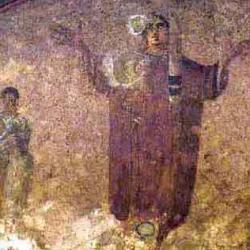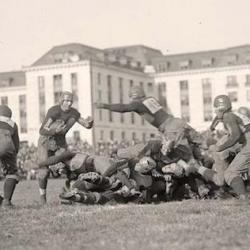How is liturgy related to life? We might explore that question by attending to the nouns: What is liturgy? What is life? I instead want to pay attention to the conjunction: What are we saying when we say we talk about liturgy “and” life?
The “and” suggests that we’re talking about two distinct realms, activities, or spheres that somehow need to be integrated. But is that true? Are liturgy and life distinct things that need to be joined together? Is life over here, liturgy over here, such that we have to introduce them and hope they get on with each other?
Is one a subset of the other? Ought we to say, Everything is life, and liturgy is one thing we do in life. Or ought we say the opposite, that everything is liturgy, and life is what we do liturgically? Are they two dimensions of one thing, one reality?
I suspect that the “and” seduces us to follow the first tack, to take liturgy and life as distinct realms or sets of activities that need to be integrated. And I’m certain that many of our problems in understanding liturgy arise from the initial dualistic conception of life “and” liturgy, the notion that liturgy is the set-apart thing what we do on the one set-apart day, Sunday, an island of sanctified activity in an otherwise bleakly unsanctified landscape. Life is what we do on the days that aren’t set-apart.
This is the picture being assumed when we ask whether the liturgy has any “practical” value. We’re asking to see how liturgy – Sunday activity – applies to this distinct reality of life – other-daily activity.
On the face of things, this is an odd way to look at the question. Christian worship is, after all, penetrated by things and actions that are the stuff of life outside worship.
Worship is language. A liturgy begins with an invocation, includes responses of prayer, reading of Scripture, teaching and preaching. It’s infused with language from beginning to end.
Liturgical language has some unique features. Some words and turns of liturgical phrase are not common outside liturgy. Yet it’s still the same language, and for many Christians it’s the language of everyday life. (The Latin Mass exemplifies the opposite tendency, stressing the “and” that separates liturgy and life.)
What do we talk about? We confess our sins. We talk about God and Jesus and history in the creed. We hear talk about all kinds of things in Scripture readings and preaching. We pray about sickness and health, politics and economic distress, persecution and war. The whole world enters the liturgy through our language.
Language isn’t accidental or expendable. If life didn’t come into the liturgy in our language, there would be no liturgy, or it would be a very defective liturgy. If we didn’t speak about Scripture or pray about real-world needs, we’d have no worship service at all.
Worship includes the arts. We sing. Congregations often worship in physical spaces that are adorned with stained glass, murals, decorative patterns on floor and ceiling. Much Western art was designed specifically for liturgy – music composed for singing, architecture for worship spaces, paintings and sculpture to glorify those spaces.
We bring our money. There’s a strain of opinion that sees an offering as a violation of the sanctity of worship, but this is a good test in fact of whether we are thinking about liturgy and life properly. Does our liturgy have a place for gifts of money or other things of value, or is money seen as purely secular, purely outside liturgy? Rejecting the offertory to protect the sanctity of the service is another way of stressing the “and” that keeps life and liturgy safely separated.
We eat and drink. Alexander Schmemann remarks on the fact that eating and drinking brings the whole world into the liturgy, an entire economy of grain and grape production and distribution, the realities of hunger and a just use of resources. There is a world in the loaf of bread, and in our eating it together in the presence of God.
Biblical liturgies display these same features. The tabernacle and temple were artistic productions full of artistic productions. Israelites brought the produce of their fields and their animals to offer on the altar. At various points in Israel’s history, the people brought tribute of gold and silver for the temple. David organized Israel’s entire production around the maintenance of the temple and temple worship (1 Chronicles 22-29).
The whole of human life is brought into the liturgy, in part to affirm the goodness of all things. In the liturgy, we acknowledge that all things come as gifts from God, and through our worship all of life is filled with the glory of God and the thanksgiving of God’s people.
Life also enters the liturgy to be judged, purified, renewed. We bring language into the presence of God so that our language can be turned to its proper uses: confession, absolution, prayer, praise, and thanksgiving. Speaking, singing, praying, and hearing the word of God brings our language under judgment.
Clive James has said that the Bible is essential for protecting us from ideology, cant, trendy theories. It cuts through our obfuscations and distortions of language and keeps our language honest.
A liturgical offering affirms that our money and goods are goods. They are acceptable offerings to God; He doesn’t scorn our gifts. But this affirmation also has a critical edge to it. By offering our goods in worship we confess that we have nothing that we have not received. We acknowledge that money is not God, but God’s. As we acknowledge that we are stewards of God’s gifts, we come under judgment for our greed, which is an idolatry of Mammon.
Our eating and drinking at the Lord’s table displays the true significance of eating and drinking. The Eucharist affirms the goodness of the creation, the creation that is given to become us, to be taken up into ourselves and offered as living sacrifice. Eating and drinking is our first experience of grace, the gift of creation, of the goodness and joy and tastiness of the world God made.
Eucharistic eating and drinking also brings our eating and drinking under judgment. Paul says that we must discern the body, recognize others, share, defer as we eat; otherwise, we eat and drink judgment on ourselves. The Eucharist judges our selfish eating and drinking, our refusal to share bread, our gluttony that makes a god of our belly. At the Eucharist we are incorporated into Jesus, the One who gave His life to feed others.
Liturgy disciplines us in a proper otherworldliness, a proper recognition of the limits of this world and a detachment from the world’s idolatries. And this liturgical otherworldliness is the only basis for a proper worldliness. Life enters liturgy so that life can be rendered liturgical. We offer a sacrifice of praise so that our lives can be permeated with sacrifice.
So, not “liturgy and life.” Rather, liturgy and life coinhabit one another, in perichoretic rhythm. Thus: “life in liturgy” so that we can live out “liturgy in life” and the “liturgy of life.”











